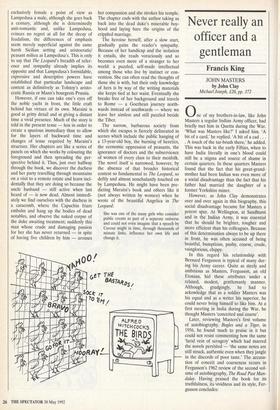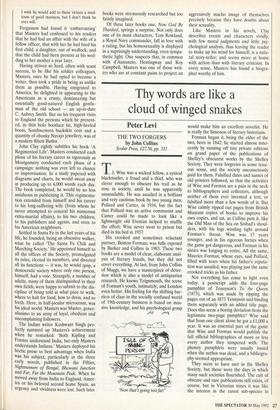Never really an officer and a gentleman
Francis King
JOHN MASTERS by John Clay Michael Joseph, f20, pp. 372 One of my brothers-in-law, like John Masters a regular Indian Army officer, had briefly met him in Quetta during the War. 'What was Masters like?' I asked him. 'A bit of a card,' he replied. 'A bit of a cad . . . . A touch of the tar-brush there,' he added.
This was back in the early Fifties, when to have India literally in one's blood could still be a stigma and source of shame in certain quarters. In these quarters Masters found that the fact that his great-grand- mother had been Indian was even more of a social disadvantage than the fact that his father had married the daughter of a former Yorkshire miner.
However, as John Clay demonstrates over and over again in this biography, this social disadvantage became for Masters a potent spur. At Wellington, at Sandhurst and in the Indian Army, it was essential that he should be brighter, tougher and more efficient than his colleagues. Because of this determination always to be up there in front, he was often accused of being boastful, bumptious, pushy, coarse, crude, vainglorious, chippy.
In this regard his relationship with Bernard Fergusson is typical of many dur- ing his Army career. Quite as steely and ambitious as Masters, Fergusson, an old Etonian, hid these attributes under a relaxed, modest, gentlemanly manner.
Although, grudgingly, he had to ackowledge that as a soldier Masters was his equal and as a writer his superior, he could never bring himself to like him. At a first meeting in India during the War, he thought Masters 'conceited and coarse'.
Later, reviewing Masters's first volume of autobiography, Bugles and a Tiger, in 1956, he found much to praise in it but could not resist commenting how the same
'lurid vein of savagery' which had marred the novels persisted — 'the same notes are still struck, authentic even when they jangle in the discords of poor taste.' The accusa- tion of conceit and coarseness recurs in Fergusson's 1962 review of the second vol-
ume of autobiography, The Road Past Man- dalay. Having praised the book for its truthfulness, its vividness and its style, Fer- gusson concludes:
I wish he would add to these virtues a mod- icum of good manners, but I don't think he ever will.
Fergusson had found it 'embarrassing' that Masters had confessed to his readers that he had had an affair with the wife of a fellow officer, that with her he had bred his first child, a daughter, out of wedlock, and that the child had been present at his wed- ding to her mother a year later.
Having striven so hard, often with scant success, to be like his soldier colleagues, Masters, once he had opted to become a writer, then took a pride in being as unlike them as possible. Having emigrated to America, he delighted in appearing to the Americans as a crusty, domineering but essentially good-natured English gentle- man of the old school — an up-to-date C. Aubrey Smith. But on his frequent visits to England the persona which he present- ed, in thin bolo bootlace tie, high-heeled boots, Southwestern buckskin coat and a quantity of chunky Navajo jewellery, was of a modern Rhett Butler.
John Clay rightly subtitles his book 'A Regimented Life'. Masters conducted each phase of his literary career as rigorously as Montgomery conducted each phase of a campaign: nothing was ever left to chance or improvisation. In a study papered with diagrams and charts, he would sweat away at producing up to 6,000 words each day. The book completed, he would be no less assiduous in publicising it. This regimenta- tion extended from himself and his career to his long-suffering wife (from whom he never attempted to conceal his numerous extra-marital affairs), to his two children, to his publishers and agents, and even to his American neighbours.
Settled in Santa Fe in the last years of his life, he founded, being an obsessive walker, what he called The Santa Fe Chili and Marching Society.' He appointed himself to all the offices of the Society, promulgated its rules, elected its members, and directed all its functions — it was, he would quip, a democratic society where only one person, himself, had a vote. Strangely, a number of adults, many of them distinguished in their own fields, were happy to submit to the dis- cipline of being told at what pace to walk, where to halt for food, how to dress, and so forth. Here, in half-jocular microcosm, was his ideal world: Masters was Master, gener- alissimo to an army of loyal, obedient and uncomplaining followers.
The Indian writer Kushwant Singh per- fectly summed up Masters's achievement when he remarked: 'Both Kipling and Forster understand India, but only Masters understands Indians.' Masters deployed his hectic prose to best advantage when India was his subject, particularly in the three early novels, published in the Fifties, Nightrunners of Bengal, Bhowani Junction and Far, Far the Mountain Peak. When he moved away from India to England, Amer- ica or his beloved second home Spain, an urgency and vividness were lost. Such later
books were strenuously researched but too faintly imagined.
Of these later books one, Now God Be Thanked, springs a surprise. Not only does one of its main characters, Tom Rowland, a Royal Navy commander, fall in love with a rating, but his homosexuality is displayed in a suprisingly understanding, even sympa- thetic light. One suspects that, in common with d'Annunzio, Hemingway and Roy Campbell, Masters was one of those writ- ers who are at constant pains to project an
aggressively macho image of themselves precisely because they have doubts about their sexuality.
Like Masters in his novels, Clay describes events and characters vividly, with few moral judgments and little psy- chological analysis, thus leaving the reader to make up his mind for himself; is a natu- ral story-teller; and seems more at home with action than with literary criticism. In every sense, Masters has found a biogra- pher worthy of him.

















































 Previous page
Previous page